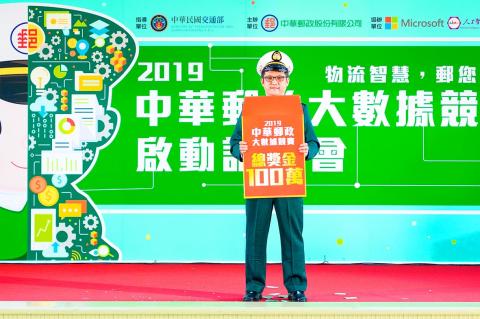Chunghwa Post is offering NT$1 million (US$32,395) in total prize money in a competition that asks entrants to create a service people can use to access data it collects.
The company is speeding up the provision of smart logistics services, said Liu Shi-biao (劉錫標), director of Chunghwa Post’s training institute.
In addition to “iPostboxes” — its unstaffed postal service terminals — staff use personal digital assistants to collect signatures when confirming receipt of registered mail, Liu said, adding that it is also implementing a six-digit postal code system to facilitate delivery services.

Photo courtesy of Chunghwa Post
Data the company collected last year would be released for the competition, including tallies of registered mail, express mail and packages, as well as delivery routes and time required for delivery, Liu said.
Chunghwa Post vice president Chou Rei-chi (周瑞祺) said that the company has collected a massive and diverse database, which would be useful when processed.
It received and delivered more than 300 million pieces of registered mail, 12 million pieces of express mail and 25 million packages last year, Chou said.
“Mining this big data could turn out to be a gold mine,” he said.
The competition would be conducted in three stages: preliminary, semi-finals and final, the company said, adding that teams of two to four people, with at least half being undergraduate or graduate students, can enter.
The teams can have one professor as an adviser and teams must develop topics and analyze the data themselves, it said.
Microsoft Taiwan and Systex Software have provided an operating platform and would arrange experts to advise teams, it said.
The top team is to receive NT$300,000, the company said, adding that 70 teams had registered.
Chunghwa Post said it would also make data collected from savings and insurance services available next year, while e-commerce and retail service data would be made public in 2021.

SHIPS, TRAINS AND AUTOMOBILES: The ministry has announced changes to varied transportation industries taking effect soon, with a number of effects for passengers Beginning next month, the post office is canceling signature upon delivery and written inquiry services for international registered small packets in accordance with the new policy of the Universal Postal Union, the Ministry of Transportation and Communications said yesterday. The new policy does not apply to packets that are to be delivered to China, the ministry said. Senders of international registered small packets would receive a NT$10 rebate on postage if the packets are sent from Jan. 1 to March 31, it added. The ministry said that three other policies are also scheduled to take effect next month. International cruise ship operators

NUMBERS IMBALANCE: More than 4 million Taiwanese have visited China this year, while only about half a million Chinese have visited here Beijing has yet to respond to Taiwan’s requests for negotiation over matters related to the recovery of cross-strait tourism, the Tourism Administration said yesterday. Taiwan’s tourism authority issued the statement after Chinese-language daily the China Times reported yesterday that the government’s policy of banning group tours to China does not stop Taiwanese from visiting the country. As of October, more than 4.2 million had traveled to China this year, exceeding last year. Beijing estimated the number of Taiwanese tourists in China could reach 4.5 million this year. By contrast, only 500,000 Chinese tourists are expected in Taiwan, the report said. The report

The Forestry and Nature Conservation Agency yesterday launched a gift box to market honey “certified by a Formosan black bear” in appreciation of a beekeeper’s amicable interaction with a honey-thieving bear. Beekeeper Chih Ming-chen (池明鎮) in January inspected his bee farm in Hualien County’s Jhuosi Township (卓溪) and found that more than 20 beehives had been destroyed and many hives were eaten, with bear droppings and paw prints near the destroyed hives, the agency said. Chih returned to the farm to move the remaining beehives away that evening when he encountered a Formosan black bear only 20m away, the agency said. The bear

HORROR STORIES: One victim recounted not realizing they had been stabbed and seeing people bleeding, while another recalled breaking down in tears after fleeing A man on Friday died after he tried to fight the knife-wielding suspect who went on a stabbing spree near two of Taipei’s busiest metro stations, Taipei Mayor Chiang Wan-an (蔣萬安) said. The 57-year-old man, identified by his family name, Yu (余), encountered the suspect at Exit M7 of Taipei Main Station and immediately tried to stop him, but was fatally wounded and later died, Chiang said, calling the incident “heartbreaking.” Yu’s family would receive at least NT$5 million (US$158,584) in compensation through the Taipei Rapid Transit Corp’s (TRTC) insurance coverage, he said after convening an emergency security response meeting yesterday morning. National